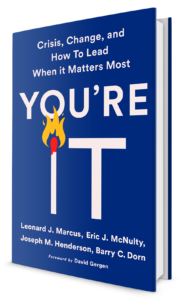Become a better crisis leader while equipping yourself with the tools for every day transformative leadership
Today, in an instant, leaders can find themselves face-to-face with crisis. An active shooter. A media controversy. A data breach. In You’re It, the faculty of the National Preparedness Leadership Initiative at Harvard University takes you to the front lines of some of the toughest decisions facing our nation’s leaders-from how to mobilize during a hurricane or in the aftermath of a bombing to halting a raging pandemic. They also take readers through the tough decision-making inside the world’s largest companies, hottest startups, and leading nonprofits.
The authors introduce readers to the pragmatic model and methods of Meta-Leadership. They show you how to understand what is happening during a moment of crisis and change, what to do about it, and how to hone these skills to lead high-performing teams. Then, when crisis hits, you can pivot to be the leader people follow when it matters most.
A book for turbulent times, You’re It is essential reading for anyone preparing to lead an adaptive team through crisis and change.
“Whether the situation you’re facing is ordinary or extraordinary, You’re It! can equip you with the tools to lead people effectively through times of change and turmoil.”―Doug Conant, Founder and CEO, ConantLeadership, former CEO of Campbell Soup Company
“A practical, how-to manual for those who must exercise leadership in crisis situations. You’re It is a highly readable, essential primer for anyone who is called to lead when people need it most.”―Janet Napolitano, Former Department of Homeland Security Secretary, President of the University of California, and author of How Safe Are We?: Homeland Security Since 9/11
“Every leader dreams (and agonizes) about his or her “leadership moment”-that singular crisis or challenge that will test our character and define our legacy. You’re It shows what it takes to prepare for that moment. Its insights, frameworks, and genuinely riveting stories will prepare leaders in any field to seize an opportunity or avoid disaster. Read this book, take its lessons to heart, and get ready to lead.”―William C. Taylor, co-founder of Fast Company and author of Simply Brilliant
“The real beauty of this highly readable book is that today, we all find ourselves leading through crises at work, in our families, and in our communities. And it is packed with fresh, new ideas about leadership that are brilliant, practical and relevant. The authors’ model for how to think, what to do, and how to unite people when extreme crisis hits works, and they’ve got excellent research and fascinating stories from real life to prove it.”―Annie McKee, bestselling author and Senior Fellow, University of Pennsylvania
 Renegotiating Health Care: Resolving Conflict to Build Collaboration (Marcus, L., Dorn, B., and McNulty, E.; Jossey-Bass, 2011) addresses leadership challenges in the fast-changing world of health care. This thoroughly revised and updated second edition offers a practical guide to negotiation and conflict resolution in the health care field. It explores why unresolved conflict can hamper any organization’s ability to make timely, cost-effective decisions and implement new strategies. The book focuses on the complex interactions between those who deliver, receive, administer, and oversee health care. It defines negotiation techniques and conflict resolution approaches that can improve efficiency, quality of care, and patient safety. Renegotiating Health Care outlines strategies and methods to resolve the myriad thorny issues encompassing the health care enterprise. It should be required reading for students and professionals in health services management, clinicians, leaders, policy makers, and conflict resolution experts working in the health care field. Buy on Amazon…
Renegotiating Health Care: Resolving Conflict to Build Collaboration (Marcus, L., Dorn, B., and McNulty, E.; Jossey-Bass, 2011) addresses leadership challenges in the fast-changing world of health care. This thoroughly revised and updated second edition offers a practical guide to negotiation and conflict resolution in the health care field. It explores why unresolved conflict can hamper any organization’s ability to make timely, cost-effective decisions and implement new strategies. The book focuses on the complex interactions between those who deliver, receive, administer, and oversee health care. It defines negotiation techniques and conflict resolution approaches that can improve efficiency, quality of care, and patient safety. Renegotiating Health Care outlines strategies and methods to resolve the myriad thorny issues encompassing the health care enterprise. It should be required reading for students and professionals in health services management, clinicians, leaders, policy makers, and conflict resolution experts working in the health care field. Buy on Amazon…
Download an Excerpt of the Second Edition of Renegotiating Health Care: RHC 2nd Ed Excerpt.
“An outstanding book! I learned their principles of meta-leadership while at the CDC and continue to use them at ABC News. This book is a must for anyone in leadership: practical, intuitive, and priceless.”
~ Richard E. Besser, MD, chief health and medical editor, ABC News and former acting director, Centers for Disease Control and Prevention (CDC)
“The health care sphere we inhabit would unquestionably be more satisfying if everyone adopted the cooperative techniques taught in this book.”
~ New England Journal of Medicine
Selected Articles and Papers
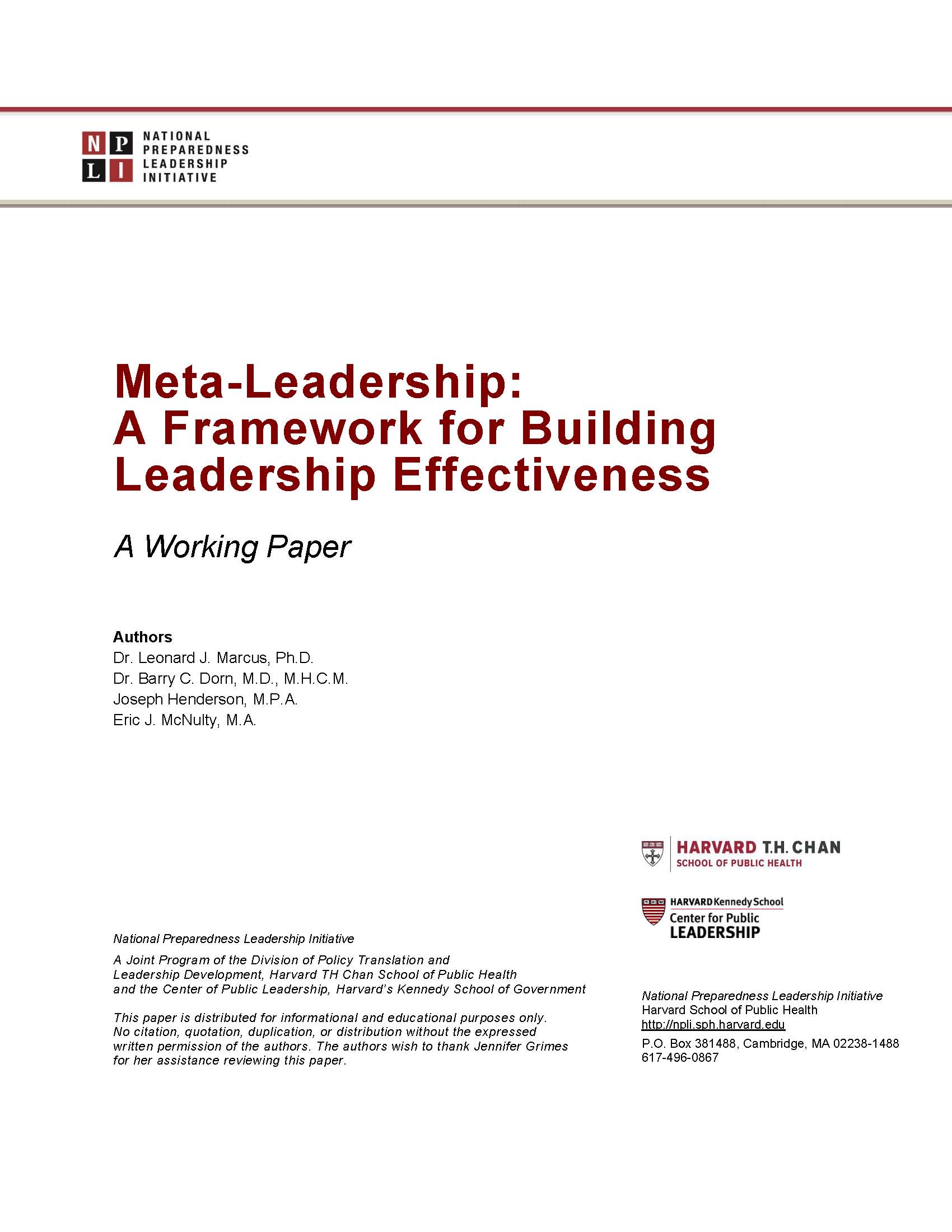 Meta-Leadership: A Framework for Building Leadership Effectiveness (Marcus, L., Dorn, B., Henderson, J. and McNulty, E.; National Preparedness Leadership Initiative, 2105). Large organizations and the work they accomplish are becoming less hierarchical and more reliant on complex and inter-dependent connections with other entities. Leading in such an environment requires expanded thinking and activity beyond one’s formal bounds of authority. Meta-leadership is a theoretically robust and pragmatically useful evidence-based framework and practice method for generating widespread influence and cohesive action that expands the leader’s domain of engagement, leverage, and efficacy. Download the PDF: Meta-leadership Overview Working Paper Final.
Meta-Leadership: A Framework for Building Leadership Effectiveness (Marcus, L., Dorn, B., Henderson, J. and McNulty, E.; National Preparedness Leadership Initiative, 2105). Large organizations and the work they accomplish are becoming less hierarchical and more reliant on complex and inter-dependent connections with other entities. Leading in such an environment requires expanded thinking and activity beyond one’s formal bounds of authority. Meta-leadership is a theoretically robust and pragmatically useful evidence-based framework and practice method for generating widespread influence and cohesive action that expands the leader’s domain of engagement, leverage, and efficacy. Download the PDF: Meta-leadership Overview Working Paper Final.
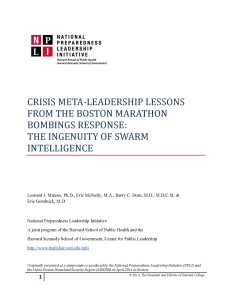 Crisis Meta-leadership Lessons from the Boston Marathon Bombings Response: The Ingenuity of Swarm Intelligence (Marcus, L., McNulty, E., Dorn, B., and Goralnick, E., 2014). This leadership analysis of the Boston Marathon bombings response is based on 1interviews with almost two dozen leaders from the public, private, and non-profit sectors. It is the most extensive analysis of these activities to date and draws upon the science of swarm intelligence to help explain the extraordinary demonstration of cooperation, collaboration, and adaptive capacity among individuals across organizational and jurisdictional boundaries in the midst of a major high-stress, high-stakes operation. Download the PDF: NPLI Marathan Bombing Leadership Response Report dist
Crisis Meta-leadership Lessons from the Boston Marathon Bombings Response: The Ingenuity of Swarm Intelligence (Marcus, L., McNulty, E., Dorn, B., and Goralnick, E., 2014). This leadership analysis of the Boston Marathon bombings response is based on 1interviews with almost two dozen leaders from the public, private, and non-profit sectors. It is the most extensive analysis of these activities to date and draws upon the science of swarm intelligence to help explain the extraordinary demonstration of cooperation, collaboration, and adaptive capacity among individuals across organizational and jurisdictional boundaries in the midst of a major high-stress, high-stakes operation. Download the PDF: NPLI Marathan Bombing Leadership Response Report dist
Intuition and Crisis Leadership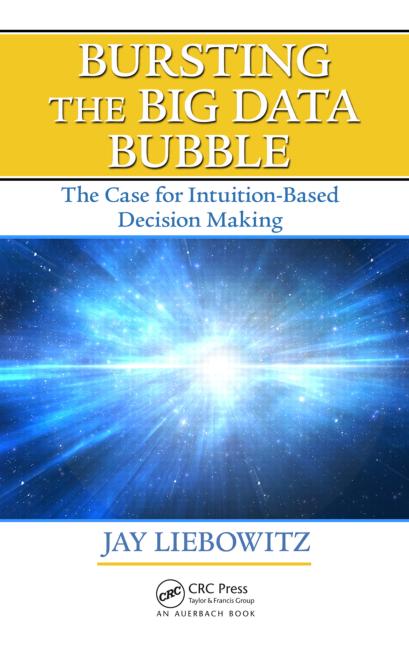 (McNulty, E., Marcus, L., and Dorn, B.; In Bursting the Big Data Bubble: The Case for Intuition-based Decision Making, 2014). While data-driven analytical decision making is increasingly common, it is not always the best choice. This article explores when a leader is best-advised to rely on data and when he or she would be better served by relying on his or her gut instincts. It uses a framework of known knowns, known unknowns, unknown unkowns, and unknown knowns as a frame to help leaders discern when gut instincts are likely to be most accurate. Drawing on recent neuroscience research, the authors that it is unknown knowns–that which is known but which cannot be identified as known–that inform the most reliable intuitive decisions.
(McNulty, E., Marcus, L., and Dorn, B.; In Bursting the Big Data Bubble: The Case for Intuition-based Decision Making, 2014). While data-driven analytical decision making is increasingly common, it is not always the best choice. This article explores when a leader is best-advised to rely on data and when he or she would be better served by relying on his or her gut instincts. It uses a framework of known knowns, known unknowns, unknown unkowns, and unknown knowns as a frame to help leaders discern when gut instincts are likely to be most accurate. Drawing on recent neuroscience research, the authors that it is unknown knowns–that which is known but which cannot be identified as known–that inform the most reliable intuitive decisions.
 The Walk in the Woods (Marcus, L., Dorn, B., and McNulty, E.; Negotiation Journal, July 2012). In this article, we describe a method we have used successfully in both academic and professional settings to rapidly introduce novice negotiators to the principles and practice of interest-based negotiation: “the walk in the woods.” The walk incorporates much of the principles of interest-based negotiation: fostering self-awareness, cultivating curiosity, and understanding the importance of world view. The walk’s effectiveness is illustrated in this article using the case of the merger of two large, complex health-care organizations.
The Walk in the Woods (Marcus, L., Dorn, B., and McNulty, E.; Negotiation Journal, July 2012). In this article, we describe a method we have used successfully in both academic and professional settings to rapidly introduce novice negotiators to the principles and practice of interest-based negotiation: “the walk in the woods.” The walk incorporates much of the principles of interest-based negotiation: fostering self-awareness, cultivating curiosity, and understanding the importance of world view. The walk’s effectiveness is illustrated in this article using the case of the merger of two large, complex health-care organizations.
Crisis preparedness and crisis response: The meta-leadership model and method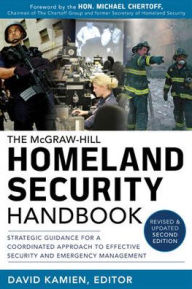 (Marcus, L., Dorn, B., Ashkenazi, I., Henderson, J., and McNulty, E; In The McGraw-Hill Homeland Security Handbook, McGraw-Hill, 2012). Leadership challenges are never greater than in the face of mass scale, complex, catastrophic disasters. In such chaotic, demanding circumstances there are leaders whose scope of thinking, capacity for unifying influence, and quality of timely performance make a meaningful difference. We call these people “Meta-Leaders.” During crises, these meta-leaders are able to marshal and engage action that is both comprehensive and cohesive – often far beyond their formal or expected bounds of authority or scope of command. They integrate and thereby leverage an extensive range of agencies, organizations, and people into formally and informally coordinated deliberate and decisive activity.
(Marcus, L., Dorn, B., Ashkenazi, I., Henderson, J., and McNulty, E; In The McGraw-Hill Homeland Security Handbook, McGraw-Hill, 2012). Leadership challenges are never greater than in the face of mass scale, complex, catastrophic disasters. In such chaotic, demanding circumstances there are leaders whose scope of thinking, capacity for unifying influence, and quality of timely performance make a meaningful difference. We call these people “Meta-Leaders.” During crises, these meta-leaders are able to marshal and engage action that is both comprehensive and cohesive – often far beyond their formal or expected bounds of authority or scope of command. They integrate and thereby leverage an extensive range of agencies, organizations, and people into formally and informally coordinated deliberate and decisive activity.
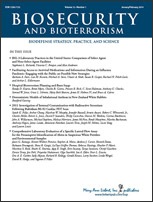 Meta-Leadership and National Preparedness Preparedness: A Model to Build Government Connectivity (Marcus, L., Dorn, B., and Henderson, J.; Biosecurity and Bioterrorism: Biodefense Strategy, Practice and Science, June 2006). Effective emergency preparedness and response requires leadership that can accomplish perceptive coordination and communication amongst diverse agencies and sectors. Nevertheless, operating within their specified scope of authority, preparedness leaders in characteristic bureaucratic fashion often serve to bolster the profile and import of their own organization, thereby creating a silo effect that interferes with effective systemwide planning and response. This article describes a strategy to overcome traditional silo thinking: “meta-leadership,” overarching leadership that intentionally connects the purposes and work of different organizations or organizational units.
Meta-Leadership and National Preparedness Preparedness: A Model to Build Government Connectivity (Marcus, L., Dorn, B., and Henderson, J.; Biosecurity and Bioterrorism: Biodefense Strategy, Practice and Science, June 2006). Effective emergency preparedness and response requires leadership that can accomplish perceptive coordination and communication amongst diverse agencies and sectors. Nevertheless, operating within their specified scope of authority, preparedness leaders in characteristic bureaucratic fashion often serve to bolster the profile and import of their own organization, thereby creating a silo effect that interferes with effective systemwide planning and response. This article describes a strategy to overcome traditional silo thinking: “meta-leadership,” overarching leadership that intentionally connects the purposes and work of different organizations or organizational units.


